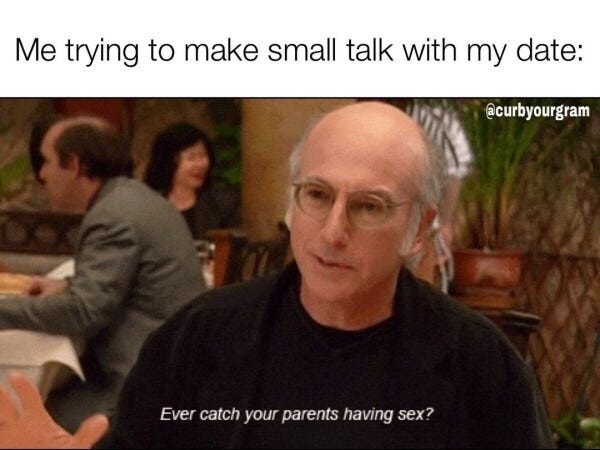The Edges of Small Talk
The author remembers times when he couldn't successfully hold a conversation
Last week I found a particularly amusing note from my college years. My anxiety around job interview compelled me to write down “tag lines” that I could repeat during the interview to make myself seem more cordial.
In my interview for the King County Metro, I wrote down the line:
“It’s another day in paradise with this kind of sunny Seattle weather”
This was preparation for the very beginning small talk in the interview. But other notes were “I’ve never done that before but I’m willing to learn” and “Thanks for giving me a chance” at the end.
Somehow I did end up getting the job. But I had a feeling that it wasn’t just because I remembered to inject these phrases throughout the interview.
Another similar note in the same year - I wrote down my retrospective to a new years resolution that I had quite obviously failed.
Calling the cashiers/barista by their first name when I see it on their name tag. You know the saddest thing is that I actually thought about this a lot of the time when buying coffee and always chickened out at the last minute.
Why didn’t I just do it? I’m not sure, but it always went a lot better in my head.
Here I demonstrated some actionable exercise and motivation towards again getting better at small talk. And yet I never managed to do it. Nowadays I order my coffee, tip by rounding up the price to the nearest dollar, and then stare at them while they steam my oat milk 😂.
What’s so hard about talking?
There are many moments where I wish I had advanced conversational lubrication skills.
When I first started jumping on enterprise sales calls for Interview Query, I would begin the call mentioning the background or ask where they were calling from. But the lack of energy I put it my small talk felt almost contagious on the other end. So nowadays I jump straight into business once both parties figure out their A/V situations.
In a few solo trips to Europe, I was made vastly aware of how not making new connections led to much less fun. And while in Iceland I could force some friendships by helping out some hitchhikers (who were naturally forced to entertain me 😆), it would mostly take alcoholic lubrication to the point of getting drunk to really bond with a lot of people.
This was the tough crux of being single. If you were single and not a conversationally engaging person, you were forced into loneliness by your own ineptitude in connecting with others. And so most social interactions I had while traveling and throughout my 20s were done through two means: forced proximity (roommates, work, etc..) and alcohol.
So what’s the secret sauce
The last week I dived into a bit of a rabbit hole into improving social skills. All the Youtube videos really hone in the social proof of being more likable, charming, and avoiding unlikeable characteristics.
But here’s a couple interesting links on and videos on improving social interactions:
The right amount of eye contact is around 50% direct eye contact when speaking and 70 to 75% when listening.
My favorite one has to be this Youtube video on how to make small talk with anyone that goes over a 5 step framework:
#1: Grease the wheels early with a compliment.
#2: Transition between topics using “reminds me of” thinking.
#3: Ping for topics of mutual interest.
#4: Get other people excited about the conversation.
#5: Create a connection with people while listening.
I think about this a lot because I see similarities across all content businesses including my own. Interview prep platforms market their success stories of people landing six figure offers. But truthfully most of the value add is breaking down the steps required to improve as an engineer or data scientist in 30 minute bite sized problems.
Which is why I wonder if the incentive to improve your social skills goes away after you make enough friends to get by or find yourself in a committed relationship. Even from Charisma on Command’s videos, the more popular videos tend to skew more towards males looking to get better at flirting and attracting women. And after that, is there any real activation energy for people to get better unless they’re working in sales?
Universally I think there’s two main self-help drivers:
Exerting less energy to converse with anyone - especially for introverts. Imagine if you could chat in-depth with anyone like you’re taking out the laundry (and in fact I believe there’s a ton of people like this).
Finding ways to reduce the amount of time towards connecting or discovering if you can connect with someone else.
Both seem like genuine great additions to anyone’s life. Especially because I’m traveling around a lot, I realize that small social interactions matter more than ever in terms of making new friends.
Now whether or not a connection can be manufactured in every case or has be genuine based on some overlap in personality, is another question entirely.
FYI - if you made it to the end of the newsletter and feel inspired to add your input on the article, please add a comment on my actual Substack page! I love it when readers send me emails but would enjoy it even more if we could make some discussions public. Obviously the ones that are private in nature can stay that way.



Very interesting read Jay!